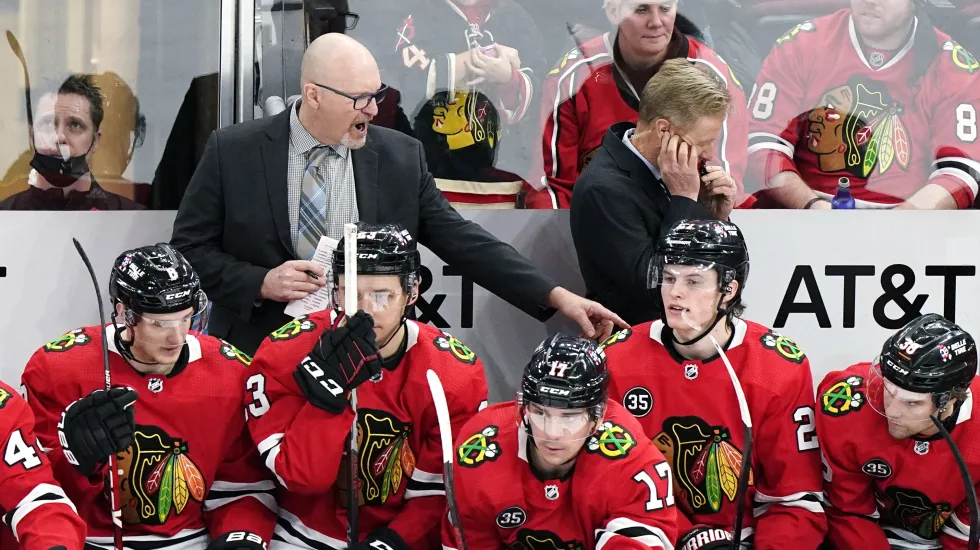
Derek King was given an almost impossible job this season.
Inherit a 1-9-2 Blackhawks team with no general manager, weeks removed from the axe-fall of the NHL’s biggest scandal in decades. Win over frustrated veterans, improve morale and right the ship despite being a mere interim coach with no job security beyond this season. Navigate an in-season rebuild declaration and the trades of the team’s starting goalie and second-leading goal-scorer. Keep the team fighting until the final day of a totally lost season.
Considering the circumstances, King has done an admirable job — arguably as good a job as anyone could’ve done.
“My beard’s grayer, [but] I’ve learned the league,” King told the Chicago Sun-Times recently. “I’m comfortable with ... the whole day-to-day operations: dealing with the media, dealing with management, dealing with the players. I’ve just gotten better, whether it’s with drills or line changing and managing everything.
“I’ve grown and I’ve improved, and I still have to improve. As a coach, if you think you’ve figured it out, then you’re in trouble. I haven’t figured it out. I never will figure it out. But as long as I keep getting better every year ...”
The 55-year-old has managed it all with an unfettered realness rarely seen in the NHL.
His total lack of ego, down-to-earth personality, earnest sense of humor, patience with failure and quiet optimism for each new day are all rare traits for a hockey coach; his combination of all five have made him something of a unicorn in these circles.
“It’s [about] making sure I’m communicating this to everybody,” he said. “My door is always open. I try to make sure everybody knows where they stand. I’m honest with them. I don’t sugarcoat anything. I’m not telling what they want to hear, I’m telling what they should hear. This is just the way it is, and I lay it out for them and it seems to work.”
His honest yet nonchalant approach to the job — giving him the image of a regular guy thrust in charge of the Hawks — worked best the first few months.
He brightened the mood, loosened the clenched fists and tight shoulders and reminded the players that it was “OK to make mistakes.” The team’s 10-6-0 record during his first 16 games in charge felt rather remarkable.
But in mid-December, as it inevitably does for every new coach, King’s honeymoon phase wore off.
“Everything’s going good; everybody’s talking [positively] about the team and the changes,” he said. “Then all of a sudden, you go on one of these losing streaks and everything switches. You get back into being fragile again. ... But it was the same [message]: ‘Don’t get all uptight. Don’t let that creep back into this locker room.’ And for the most part, we’ve done a good job.”
Since Dec. 16 (through Sunday), the Hawks have gone 14-24-9. Lack of talent, particularly in the lower half of the lineup, is undoubtedly the biggest factor; this team wouldn’t be close to .500 even if Barry Trotz was coaching.
Some of King’s weaknesses have nonetheless been exposed during these months. He’s not a brilliant tactician, nor would he claim to be. His freedom to change the Hawks’ systems has been limited by his interim tag, too — he dislikes the Hawks’ 1-2-2 neutral-zone trap formation that Jeremy Colliton installed, for example, but has held off on altering it.
He’s also inexperienced with line matchups and situational player deployment, since he’d always rotated everyone equally in the AHL. He describes situations where, for instance, he “maybe shouldn’t have had this guy out for this faceoff” as his biggest learning moments.
But his eagerness to trust his players, even those who haven’t fully earned that trust yet, might actually be the perfect approach for a rebuilding team that will have no choice but to trust unproven players in the years ahead.
“You put these guys in situations where you want them to succeed, and hopefully they can get that job done,” he said. “Sometimes they fail, and that’s when I start thinking the easy way would be to put the veteran guys out all the time. But I like to give these younger guys a chance to have that opportunity.”
King indeed fits the so-called “players’ coach” label to a tee.
“I don’t like to look at it like an ‘everybody works for me’ kind of thing,” he added. “Obviously I have to make the final decisions...but I get a lot of information from our coaching staff, and then I love to hear what the players have to say. These are the guys that are on the ice battling; it’s not me. So it’s nice to get some feedback from them.”
King’s future remains uncertain. The odds seem roughly 50-50 whether he’ll return to the NHL or slide back into the AHL in Rockford come September.
General manager Kyle Davidson has maintained all along that the search for a permanent coach wouldn’t begin until after the season, but that moment is quickly approaching. Numerous other candidates will be interviewed and considered, and the Hawks may be reluctant to ultimately promote another interim guy.
Even if he doesn’t get the permanent job, King’s positive impacts in a brutal situation this season deserve commendation.







